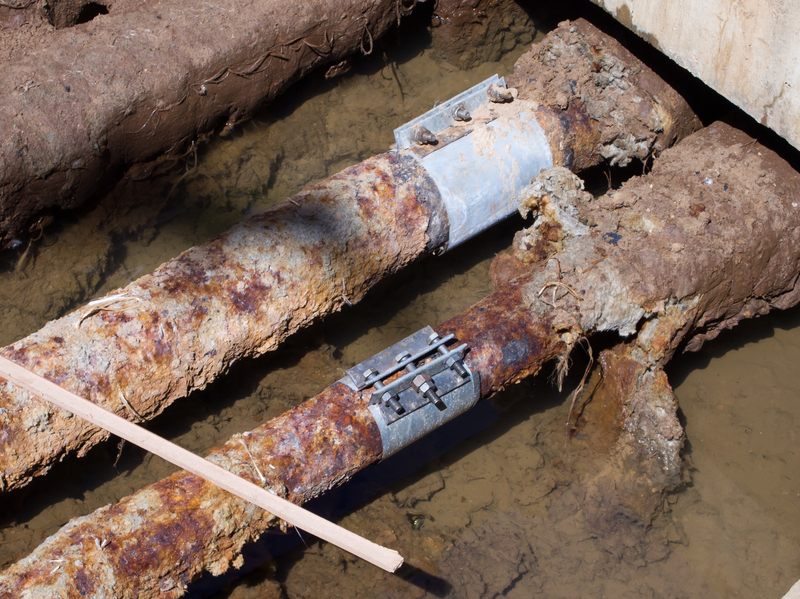Maryland Materials and Ethics 16 PDH Discount Package 1
Courses in this Package
Structures and Properties of Metals (T07-001)
Corrosion: Overview (H04-001)
Coating Application and Inspection (T03-001)
Engineering Ethics for Maryland Professional Engineers (MD2-005)

The online engineering PDH course addresses two aspects of metals. The first part of this course deals with the basic structures of metals and how those structures are affected by various processes. In addition, it contains information on the various imperfections and defects that the metal may sustain and how they affect the metal. The second part contains information on metal properties which are considered when selecting material for engineering design purposes. Each of these properties contains a discussion on how the property is affected and the metal's application.
This 7 PDH online course is applicable to structural and mechanical engineers, construction and design personnel, technical staff and facility operators who are interested in gaining a better understanding of the structures and properties of metals.
This PE continuing education course is intended to provide you with the following specific knowledge and skills:
- Understanding bonding
- Learning about common lattice types
- Understanding grain structure and boundary
- Learning about polymorphism and alloys
- Knowing the imperfection in metals
- Learning about stress and strain and Young's
- Modulus Understanding stress-strain relationship
- Understanding the physical properties of materials
- Learning about working metals and corrosion
- Understanding hydrogen embrittlement
In this professional engineering CEU course, you need to review Modules 1 and 2, "Structures and Property of Metals" of the Department of Energy Publication DOE-HDBK-1017/1-93, "Material Science".
Upon successful completion of the quiz, print your Certificate of Completion instantly. (Note: if you are paying by check or money order, you will be able to print it after we receive your payment.) For your convenience, we will also email it to you. Please note that you can log in to your account at any time to access and print your Certificate of Completion.

This online engineering PDH course provides basic information on the chemical interaction taking place during the corrosion process between the environment and the corroding metal. It also describes preventive measure to minimize or control the corrosion process.
Uncontrolled corrosion can cause many serious problems. Corrosion occurs continuously, and every metal in every facility is subject to some type of corrosion. Even though corrosion cannot be eliminated, it can be controlled.
This 4 PDH online course is applicable to chemical and environmental engineers, design and construction personnel, technical staff and facility operators who are interested in gaining a better understanding of the theory of corrosion.
This PE continuing education course is intended to provide you with the following specific knowledge and skills:
- Corrosion theory
- General corrosion
- Crud and galvanic corrosion
- Specialized corrosion
In this professional engineering CEU course, you need to review Module 2, "Corrosion" of the Department of Energy Publication DOE-HDBK-1015/1-93, "Chemistry".
Upon successful completion of the quiz, print your Certificate of Completion instantly. (Note: if you are paying by check or money order, you will be able to print it after we receive your payment.) For your convenience, we will also email it to you. Please note that you can log in to your account at any time to access and print your Certificate of Completion.

This online engineering PDH course presents the technologies, techniques, advantages and limitations, equipment, typical coating types involved, and safety considerations for each type of application method.
The choice of an application method depends on the type of coating to be applied, the type and size of surface to be coated, and governing environmental regulations. There are various methods of coating application, including brush application, roller application, conventional spray, high volume-low pressure spray, airless spray, plural component spray, and electrostatic spray.
Approximately 85 percent of all premature coating failures are a result of poor surface preparation, inadequate mixing, thinning, and/or poor coating application. Onsite quality control inspection during surface preparation and coating application procedures can help prevent failures of these types. Proper inspection techniques must be combined with knowledgeable instrument use, good common sense, and thorough documentation of work activities and inspection checkpoints to help ensure specification compliance. The amount of inspection and the specific inspection checkpoints will vary with the type and size of the coating project. This course presents eleven quality control inspection procedures as follows:
- Pre-surface preparation inspection
- Ambient conditions
- Compressed air cleanliness
- Surface profile
- Surface cleanliness
- Paint storage, mixing, and thinning procedures
- Application techniques
- Wet and dry coating thickness
- Pinhole detection
- Adhesion
- Cure
This 3 PDH online course is applicable to engineers, design and construction personnel, and other technical professionals who are interested in gaining a better understanding of coating application and inspection.
This PE continuing education course is intended to provide you with the following specific knowledge and skills:
- Methods of coating application
- Documentation of coating applications
- Pre-surface preparation inspection
- Measurement of ambient conditions
- Assessment of compressed air cleanliness
- Measurement of surface profile
- Evaluation of surface cleanliness
- Paint storage, mixing, and thinning
- Measurement of wet coating thickness
- Nondestructive measurement of dry coating thickness
- Destructive measurement of dry coating thickness
- Cleanliness and time (cure) between coats
- Holiday/pinhole detection
- Adhesion testing and evaluation
In this professional engineering CEU course, you need to review Chapters 8 and 9 of the “Painting: New Construction and Maintenance” engineering manual, published by the United States Army of Corps of Engineers (USACE), Publication Number EM 1110-2-3400.
Upon successful completion of the quiz, print your Certificate of Completion instantly. (Note: if you are paying by check or money order, you will be able to print it after we receive your payment.) For your convenience, we will also email it to you. Please note that you can log in to your account at any time to access and print your Certificate of Completion.

This online engineering PDH course presents the laws and rules of ethics and professional responsibility governing the practice of engineering in the State of Maryland. Excerpts from Title 14 of the Maryland Codes and Title 9, Subtitle 23 of the Maryland Regulations which relate to the rules of profession conduct, continuing education requirements, proper use of seal and other pertinent regulatory provisions are presented in this course.
Engineering ethics is (1) the study of moral issues and decisions confronting individuals and organizations involved in engineering and (2) the study of related questions about moral conduct, character, ideals and relationships of peoples and organizations involved in technological development (Martin and Schinzinger, Ethics in Engineering).
Since engineers are faced with frequent moral and ethical dilemmas while practicing their engineering profession, this course will provide you with moral and ethical guidance in your decision making process. Most importantly, it will provide you with insight on how to conduct, respect and protect your engineering practice with the utmost professionalism.
This 2 PDH online course is applicable to Professional Engineers licensed in the State of Maryland and who are required to demonstrate continuing professional competency in engineering ethics as a condition of their license renewal. For each renewal period, every licensee must complete sixteen (16) professional development hours, at least one of which must be relative to the rules of professional responsibility, conduct and ethics.
This PE continuing education engineering course is intended to provide you with the following specific knowledge and skills:
- Gaining an overview of the laws and rules regulating the practice of engineering in the State of Maryland and their application to Professional Engineers
- Understanding the roles of the Maryland Board as well as its disciplinary authority and disciplinary process
- Learning about engineering ethics and the rules of professional conduct and responsibility
- Understanding the continuing education requirements, proper use of seal and other pertinent provisions in the State of Maryland
- Reviewing the disciplinary cases, range of violations and corresponding penalties imposed by the Maryland Board
Upon successful completion of the quiz, print your Certificate of Completion instantly. (Note: if you are paying by check or money order, you will be able to print it after we receive your payment.) For your convenience, we will also email it to you. Please note that you can log in to your account at any time to access and print your Certificate of Completion.